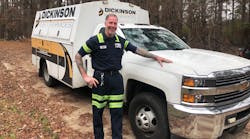Former helicopter mechanic does it all for Dickinson customers
For the past 12 years, Josh Lawhorn has serviced all classes of commercial vehicles for Dickinson Fleet Services, always on the move as a mobile service technician in Hampton, Georgia. Even with all that travel time, and change of scenery and componentry, Lawhorn’s current job is more grounded than his previous one.
In the mid-90s, Lawhorn served in the United States Marine Corps as a CH-46e Sea Knight helicopter mechanic, stationed in Hawaii and California. He received a meritorious promotion to Lance Corporal after competing helicopter training school with the top score.
Lawhorn, who said he’s been turning wrenches since he was strong enough to pick one up, began his education by taking mechanic classes in high school. After his Marine Corps training, he got a job fueling trucks for major leasing companies where he did light repairs on the fuel island to keep the shop’s mechanics from having to stop working on major items. He then worked his way into the shops. His land-based vehicle maintenance career has spanned two decades.
All of these experiences have made Lawhorn an invaluable asset to whatever fleet calls for Dickinson’s aid. And it’s all in a day’s work for a mobile technician.
“My role is to show up and be assigned work the customer needs to get done,” Lawhorn explained. “Most of it is keeping up with preventive maintenance services, but if a shop is shorthanded I can fill in to keep the workload from overwhelming their technicians. I strive to do what I can to lighten the load for the customer’s mechanics if they’re lacking staff or experience to diagnose and repair trucks in a timely manner.”
Lawhorn called himself an “extra set of hands on site for customers,” and because he works on so many types of vehicles, those hands can perform a great many tasks.
“I can bounce between different locations as needed,” Lawhorn related. “I can be working on garbage trucks or on-highway tractors and trailers for major fleets. My workday is like going to any regular shop, except I operate from a mobile toolbox.”
With all of that experience, he has plenty of mistakes to learn from, making him a better technician for the next job.
A lot of the diagnostic errors that Lawhorn said he sees are caused by ignoring the basics. “I’ve been guilty of things like replacing a starter because someone said it just clicks, only to find out they didn’t test the batteries and they’re dead,” he related. “That’s why I’m apprehensive about ordering parts until I do a thorough diagnostic. The customer might not want to pay for extra diagnostic time, but when the replacement part is expensive, there’s no reason to just swap parts until something fixes the issue.
“I’ve also been guilty of replacing a part and then taking that part out of the diagnostic equation,” Lawhorn continued. “Thinking that it’s new or was just replaced—so it can’t be the problem—is easy, but even new parts can be defective. Or maybe I put it on incorrectly or forgot to plug something back in.”
Those occasional failure has led to more patience.
If he’s stumped, Lawhorn has learned to step back, walk away, and ask for someone else’s perspective. “It happens most often if I get distracted while I’m in the middle of something,” he said. “When I come back to it, I might forget where I was in the process. A derailed train of thought usually leads to mistakes.”
Regardless of the role he’s in, Lawhorn says it’s most important to him to be honest. “Things break; and whether it’s my fault or the equipment was old, I own it,” he stated. “I’m not so much in the business of fixing trucks as I am in the business of finding solutions to problems. Maybe the equipment is beyond repair or the issue is beyond my capability, but the sooner I admit it, the sooner it can be addressed.
“As much as I hate wasting a customer’s money, I really hate wasting their time,” Lawhorn added. “If something breaks in the morning and I wait until the end of the day to say something, it means I knew about the problem and then dropped it in someone else’s lap on the way out the door. That’s stealing time that could have been used to find a solution.”
The forthcoming former Marine has no problem acknowledging those mistakes, but his actions prove his skill. In Dickinson Fleet Services’ annual Top Tech competitions, Lawhorn has been a finalist four times. In 2021, he was the runner up at the event and went on to compete at TMCSuperTech where he placed 21st out of 34.




